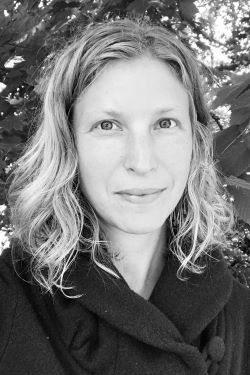
Zoé Hamstead
SPECIALIZATIONS
Environmental planning; climate planning; sustainability and resilience; environmental and climate justice; geographic and spatial analysis; urban policy and political economy; environmental governance; community engagement
PHILOSOPHY STATEMENT
Zoé Hamstead is an assistant professor in the Department of City & Regional Planning. Her work focuses on environmental planning, sustainability, urban governance, and environmental justice, particularly in the context of climate change. She uses mixed methods, including field-based data collection with sensing equipment, interviews, focus groups, participatory action research, geospatial analysis, statistical analysis, and other approaches for understanding the social justice dimensions of urban climate. Her work has been published in planning and interdisciplinary journals including Ecological Indicators, Landscape & Urban Planning, Computers, Environment, & Urban Systems, Ecology & Society, among others.
Current and past research projects, practice, and service learning courses include analysis of access to urban parks and ecological amenities, urban resilience scenario development, engaged community solar planning, and climate-exacerbated extreme heat management. Through a project entitled Sensing and Sensitivity, she integrates experiential data on people’s perceptions, subjectivities, capacities, and adaptive practices with objective measures of urban radiative temperature and other thermal indicators to understand residential thermal insecurities. Her recent co-edited volume entitled Resilient Urban Futures describes the processes of developing long-range planning capacities for climate resilience in 9 cities across Latin America, the Caribbean, and North America through six years of coordinated participatory scenario workshops. In particular, she engages in co-production approaches to develop integrative governance frameworks for heat (and more broadly, thermal) management. Her in-progress project, Critical Heat Studies, applies tenets of racial justice developed within legal and educational theory to understand why thermal insecurity has long been neglected as a fundamental environmental threat and social determinant of health, although it is deadlier than all other weather-related disasters. Hazards protection practices tend to be primarily oriented around protecting against property destruction, a highly visible outcome of extreme storm events. By contrast, thermal insecurity is often a highly personal or private experience that we struggle to represent visually and linguistically. Critical Heat Studies brings together multiple epistemologies to understand the often invisible ways that thermal threats are produced in urban physical, institutional, and socio-cognitive spaces, and to develop a political framework for addressing it as a critical environmental burden.
Prior to joining the faculty at DCRP, Dr. Hamstead was an assistant professor of environmental planning at the State University of New York at Buffalo, where she founded the Community Resilience Lab and served as director for the masters of urban planning specialization in environmental planning. Prior to her academic career, she worked as a local government land use planner and in educational development at the American Planning Association.
Publications
Hamstead, Zoé A., David Iwaniec, Timon McPhearson, Marta Berbés-Blázquez, Elizabeth Cook, Tischa A. Muñoz-Erickson. 2021. Resilient Urban Futures. Springer Urban Book Series. ISBN 978-3-030-63131-4 https://link.springer.com/book/10.1007%2F978-3-030-63131-4
Hamstead, Zoé A. 2021. How we got here: Producing climate inequity and vulnerability to urban weather extremes, in Resilient Urban Futures. Eds. Hamstead, Zoé A., David Iwaniec, Timon McPhearson, Marta Berbés-Blázquez, Elizabeth Cook, Tischa A. Muñoz-Erickson. (eds) The Urban Book Series. Springer, Cham. https://doi.org/10.1007/978-3-030-63131-4_2
Hamstead Zoé A., Paul Coseo, Saud AlKhaled, Emmanuel Frimpong Boamah, David M. Hondula, Ariane Middel, and Nicholas Rajkovich. 2020. Thermally-resilient communities: creating a sociotechnical collaborative response to extreme temperatures. Special Issue: Climate Justice: The Role of the Built Environment, in Buildings and Cities, 1(1),pp. 218-232. https://doi.org/10.5334/bc.15
Hamstead Zoé A. and Paul Coseo. 2019. Critical Heat Studies: Making Meaning for Management of Heat-as-Hazard in the 21st Century: Introduction to the Special Issue. Journal of Extreme Events, Special Issue on Heat-as-Hazard. Vol. 6, No.4. DOI: 10.1142/S2345737620030013 https://www.worldscientific.com/doi/pdf/10.1142/S2345737620030013
Hamstead, Zoé A., Carson Farmer, Timon McPhearson. 2018. Landscape-based extreme heat vulnerability assessment. Journal of Extreme Events. 5(4): 1850018-1-1850018-23. https://doi.org/10.1142/S2345737618500185
Hamstead, Zoé A., David Fisher, Rositsa Ilieva, Spencer Wood, Timon McPhearson, Peleg Kremer. 2018. Geolocated social media as a rapid indicator of park visitation and equitable park access. Computers, Environment and Urban Systems Special Issue: Human dynamics in the mobile and big data era: Towards smart and connected communities. 72:38-50 https://doi.org/10.1016/j.compenvurbsys.2018.01.007
Hamstead, Zoé A., Peleg Kremer, Neele Larondelle, Timon McPhearson and Dagmar Haase. 2016. Classification of the heterogeneous structure of urban landscapes (STURLA) as an indicator of landscape function applied to surface temperature in New York City. Ecological Indicators. Available at: http://dx.doi.org/10.1016/j.ecolind.2015.10.014
Hamstead, Zoé A. and Todd BenDor. 2010. Over-compliance in Water Quality Trading Programs: Findings from a Qualitative Case Study in North Carolina. Environment and Planning C: Government and Policy 28(1): 1-17. doi: 10.1068/c0887j